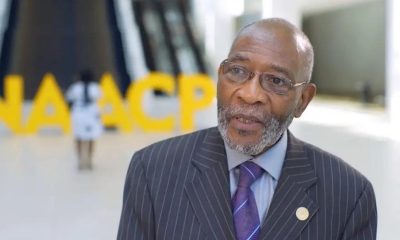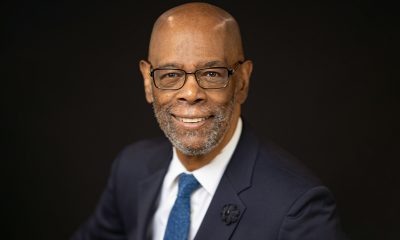National
Choosing Your Own: Definition of Race Becoming Fluid

In this image released by NBC News, former NAACP leader Rachel Dolezal appears on the “Today” show set on Tuesday, June 16, 2015, in New York. Dolezal was born to two parents who say they are white, but she chooses instead to self-identify as black. (Anthony Quintano/NBC News via AP)
JESSE J. HOLLAND, Associated Press
WASHINGTON (AP) — Rachel Dolezal, born to white parents, self-identifies as black — a decision that illustrates how fluid identity can be in a diversifying America, as the rigid racial structures that have defined most of this country’s history seem, for some, to be softening.
Dolezal resigned as the leader of the NAACP’s Spokane, Washington, branch after questions surfaced about her racial identity. When asked directly on NBC’s “Today” show Tuesday whether she is “an African-American woman,” Dolezal replied, “I identify as black.”
Her parents identified her as white with a trace of Native American heritage, and her mother, Ruthanne Dolezal, has said Rachel began to “disguise herself” as black after her parents adopted four black children more than a decade ago.
Dolezal isn’t the first person to make this type of change. Millions of Americans changed racial or ethnic identities between the 2000 and 2010 censuses, even though their choices may have contradicted what their skin color appeared to be, or who their parents said they are.
“It forces us to really question whether or not this biological basis for identity is a smart path to continue down in the future,” said Camille Gear Rich, a University of Southern California law and sociology professor who writes about elective race choices.
Americans have become comfortable with people self-identifying their race, Rich said, “but often that invocation of identity based on a biological claim isn’t backed up by anything else after the claim is made.”
In the United States, there is an expectation that people would have a biological connection to a racial or an ethnic identity they are claiming, said Nikki Khanna, a University of Vermont sociology professor. She co-authored a 2010 study that found increasing numbers of biracial adults were choosing to self-identify as multiracial or black instead of white.
“There really is no biological basis to race, but what I’m saying is that in our society the everyday person tends to think race must have some link to ancestry,” Khanna said. “So we expect that when people self-identify with a particular group they must have some ancestral link to that group.”
In the past, race was determined mostly by what other people thought a person was. For example, the Census Bureau’s enumerators would determine on their own what a person’s race was, and classify them as such. By the 1960s and 1970s, census officials were allowing people to self-identify.
Currently, the Census Bureau allows people to choose a racial category, or even multiple categories, to which they think they belong. The census identifies races as white; black or African-American; American Indian or Alaska Native; Asian; Native Hawaiian or Other Pacific Islander; and “some other race” for those claiming more than one race. There is also a Hispanic ethnic category.
People have been using that freedom since the early 2000s to move back and forth. They switched between races, moved from multiple races to a single race or back, or decided to add or drop Hispanic ethnicity from their identifiers on census forms.
Last year, a study showed that 1 in 16 people — or approximately 9.8 million of 162 million — who responded to both the 2000 and 2010 censuses gave different answers when it came to race and ethnicity. In addition, in the 2010 census, more than 21.7 million — at least 1 in 14 — went beyond the standard labels and wrote in such terms as “Arab,” ”Haitian,” ”Mexican” and “multiracial.”
Dolezal, 37, said Tuesday that published accounts described her first as “transracial,” then “biracial,” then as “a black woman.” ”I never corrected that,” she conceded, adding that “it’s more complex than being true or false in that particular instance.”
She and her parents have disagreed about her backstory. Dolezal says she started identifying as black around age 5, when she drew self-portraits with a brown crayon. Her mother told Fox News on Tuesday that’s not true.
Dolezal has gotten support from some in the black community, who say she should be allowed to self-identify as she pleases. However, other African-Americans say she is “passing” — a term mainly used to describe blacks who looked white enough to deny their African ancestry — and should not claim a racial identity that she cannot prove.
She isn’t the only person who has faced that accusation. An opponent of Houston Community College trustee Dave Wilson complained that campaign mailings Wilson sent to voters in the predominantly black district implied Wilson, who is white, was black. U.S. Sen. Elizabeth Warren of Massachusetts faced questions about her Native American ancestry during her last election after being listed as such in several law school directories.
Some people have used their ability to self-identify as another race simply to get access to resources aimed at minorities, Rich said, but “race is something that is a social contract and it is not something that you just passively inhabit.”
That’s why Rich said she isn’t comfortable with people announcing themselves as a member of a community. “There might be some spaces in which Rachel gets to be a black person, but I want to be very careful about any context in which she is taking away resources from people who have come from a more subordinated experience,” she said.
___
Jesse J. Holland covers race, ethnicity and demographics for The Associated Press. Contact him on Twitter at http://www.twitter.com/jessejholland.
Copyright 2015 The Associated Press. All rights reserved. This material may not be published, broadcast, rewritten or redistributed.
Activism
Oakland Post: Week of July 24 – 30, 2024
The printed Weekly Edition of the Oakland Post: Week of July 24 – 30, 2024

To enlarge your view of this issue, use the slider, magnifying glass icon or full page icon in the lower right corner of the browser window. ![]()
#NNPA BlackPress
NNPA NEWSWIRE — Reflecting on his long career, Biden expressed deep gratitude and pride. “Nowhere else on earth could a kid with a stutter from modest beginnings in Scranton and Claymont one day sit behind the Resolute Desk in the Oval Office. But here I am. That’s what makes America special,” he remarked, his voice tinged with emotion.
The post first appeared on BlackPressUSA.

Biden: Our Democracy Demands New Leadership
By Stacy M. Brown, NNPA Newswire Senior Correspondent
@StacyBrownMedia
In an impassioned address from the Oval Office, President Joe Biden laid bare his decision to step down from the 2024 presidential race, urging Americans to embrace a new generation of leadership. “Saving democracy is more important than any title. It’s time to pass the torch to younger voices,” Biden declared in an address that signaled a transformative shift in American politics.
Following his decision over the weekend to bow out of the race for re-election, Biden’s announcement was a clarion call for renewal. Stressing the moment’s urgency, Biden emphasized that the future of democracy depends on fresh, dynamic leadership. He endorsed Vice President Kamala Harris as the embodiment of this new era. “Years ago, I described myself as a transitional candidate, and now it’s time for that transition to take full effect,” Biden said, positioning Harris as the future of the Democratic Party.
While refraining from mentioning former President Donald Trump by name, Biden clarified that he views the twice impeached and 34 times convicted felon Republican presidential nominee as a fundamental threat to democratic values. “My record as president, my leadership on the global stage, and my vision for America’s future all merited a second term,” Biden stated. “But nothing can stand in the way of safeguarding our democracy. That includes personal ambition. So, I’ve decided the best path forward is to pass the torch to a new generation.”
Reflecting on his long career, Biden expressed deep gratitude and pride. “Nowhere else on earth could a kid with a stutter from modest beginnings in Scranton and Claymont one day sit behind the Resolute Desk in the Oval Office. But here I am. That’s what makes America special,” he remarked, his voice tinged with emotion.
Biden acknowledged that doubts about his ability to defeat Trump influenced his decision. “I revere this office, but I love my country more,” he said. “It’s been the honor of my life to serve as your president. But in defense of democracy, which is at stake, I think it’s more important than any title.”
Biden said he is determined to address crucial issues for the remainder of his term. His agenda includes lowering family costs, defending personal freedoms, protecting voting rights, combating cancer, addressing gun violence, and advocating for Supreme Court reform. Internationally, he said he aims to strengthen NATO, support Ukraine, and seek an end to the conflict in Gaza.
Biden’s endorsement of Harris has galvanized the Democratic Party, with Harris swiftly securing the backing of a majority of Democratic delegates. “I’m not going anywhere,” Biden reassured his campaign staff, now supporting Harris. “I’m going to be out there on the campaign trail with her, working tirelessly as both a sitting president and a campaigner.”
The landmark address, along with Biden’s anticipated speech at the Democratic National Convention, could prove pivotal in defining his legacy. “In a few months, Americans will decide the direction of our nation’s future,” Biden stated. “I have made my choice. I’ve expressed my views. Now the decision is in your hands, the hands of the American people.”
In the days before his decision, Biden confided in close advisors about his concerns regarding another run against Trump. His acknowledgment of those doubts underscored his commitment to putting the country’s needs above his ambitions. “The defense of democracy must come before all else,” he reiterated.
As Biden prepares to support Harris in her campaign, he remains focused on his presidential duties. His administration continues to push for significant legislative achievements, reinforcing his enduring commitment to the American people. “In just a few months, the American people will choose the course of America’s future,” Biden said. “The great thing about America is here, kings and dictators do not rule. The people do. History is in your hands. The power is in your hands. The idea of America lies in your hands.”
The post first appeared on BlackPressUSA.
#NNPA BlackPress
PRESS ROOM: Reparations Movement Partners Globally Mourn the Passing of U.S. Congresswoman Sheila Jackson-Lee
NNPA NEWSWIRE — we acknowledge the powerful legacy of U.S. Congresswoman Sheila Jackson-Lee. She was a steadfast leader in the fight for reparatory justice, carrying forward the legislative baton from the late U.S. Congressman John Conyers in 2018.
The post PRESS ROOM: Reparations Movement Partners Globally Mourn the Passing of U.S. Congresswoman Sheila Jackson-Lee first appeared on BlackPressUSA.

[July 22, 2024 – Chicago, IL] With an extremely heavy heart and a profound sense of loss, we acknowledge the powerful legacy of U.S. Congresswoman Sheila Jackson-Lee. She was a steadfast leader in the fight for reparatory justice, carrying forward the legislative baton from the late U.S. Congressman John Conyers in 2018. Her relentless efforts nearly brought HR 40 to passage in the House of Representatives in 2022, missing by just one vote. Her leadership was pivotal in advancing the bill out of the Judiciary Committee in April 2021 after a historic debate. Even after her diagnosis, Rep. Jackson-Lee fiercely collaborated with reparations leaders, pushing for President Biden to establish an HR40-like commission by Executive Order. She believed this executive path was crucial for addressing centuries of injustice. Despite setbacks in meetings with the President’s team, she remained optimistic and urged us to stay ready for progress.
The Earn the Black Vote Collaborative formed in 2023 in response to her urging to continue the fight for reparations. On April 25, 2024, the Collaborative released a poll showing significant support for President Biden to issue an Executive Order for Reparations. Congresswoman Jackson-Lee championed the poll’s findings, emphasizing the critical importance of reparations to African American and progressive communities. Her vision was clear: an Executive Order to create a federal reparations commission could drive transformative Black voter turnout and move the ball toward justice. She had wanted the Executive Order done by Juneteenth. Tragically, just a month after Juneteenth, she left us. We have lost a great leader for reparatory justice. In honor of her legacy, we call for the establishment of the Executive Order by President Biden. We extend our deepest condolences to Representative Jackson-Lee’s family. We call on reparation activists, leaders, and legislators globally to stand with us as we honor her legacy. May the Ancestors and the Creator receive her with joy.
About the Author:
Kamm Howard is a national and international reparations scholar and activist working for over 20 years building grassroots movements to obtain reparations for African descendants in the United States.
CONTACT:
Reparations United Phone: 773-985-2990
Email: kamm@reparationsunited.org Website: https://reparationsunited.org/
The post PRESS ROOM: Reparations Movement Partners Globally Mourn the Passing of U.S. Congresswoman Sheila Jackson-Lee first appeared on BlackPressUSA.
-

 Arts and Culture3 weeks ago
Arts and Culture3 weeks agoRooted in Tradition: The Intricate History of Black Hair Braiding
-

 Bay Area4 weeks ago
Bay Area4 weeks ago“I Will Not Be Bullied,” Says Oakland Mayor Sheng Thao
-

 Bay Area2 weeks ago
Bay Area2 weeks agoPG&E Increases Rates While Bay Area Households Are Struggling to Stay Afloat
-

 Business3 weeks ago
Business3 weeks agoGov Newsom: Raising Fast Food Minimum Wage to $20 Pays Off as Jobs Multiply in Industry
-

 Activism4 weeks ago
Activism4 weeks agoOpponents of Mayor Sheng Thao Are Calling on Her to Resign Following FBI Raid
-

 Bay Area2 weeks ago
Bay Area2 weeks agoJuneteenth Mass Shooting Suspect Charge with Multiple Counts of Felony Assault by Alameda County DA Pamela Price
-

 Community1 week ago
Community1 week agoHundreds Come to Jehovah’s Witnesses’ Assembly Hall for Three-Day Program of ‘Good News’ in Fremont
-

 Activism4 weeks ago
Activism4 weeks agoOakland Coliseum Sale to AASEG: A Model for Community Development and Inclusion





















































